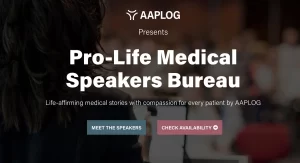AAPLOG has published an article on our blog responding to ACOG’s misguided statement dismissing abortion pill reversal (APR) as unscientific. APR refers to the use of natural progesterone to counteract the abortive effects of the drug mifepristone, the first in the two-drug regimen most used in a chemical abortion. ACOG’s statement maligns efforts by legislators to require that doctors inform patients considering mifepristone-induced abortion about APR and attempts to critique the evidence supporting it. Our article addresses this critique in detail, points out several levels of evidence that ACOG overlooks, and offers further context and insights that are relevant for medical professionals to evaluate the merits of APR.
A complete and honest evaluation of the evidence surrounding mifepristone reversal with progesterone is paramount for medical professionals. Unfortunately, APR has been the target of what can only be described as an ideologically motivated misinformation campaign by ACOG and other pro-abortion groups. The objections to informing patients about this treatment that have been circulated in the media as a result of ACOG’s statements are remarkably weak at best and dishonest at worst. For example, ACOG representative Dr. Nisha Verma has stated to the press that APR has “been shown to be potentially dangerous” based on the fact that a 2020 randomized controlled trial by Dr. Mitchell Creinin studying APR was halted prematurely because 2 participants were hospitalized. In fact, these 2 participants were in the control group – the arm receiving mifepristone followed by a placebo. Both of these women required surgical completion, and one required a blood transfusion. Out of the test group – the arm receiving mifepristone followed by progesterone – one participant visited the ER after experiencing bleeding but was found to be simply completing her abortion and required no further treatment. If anything, the Creinin study raises concerns about the safety of not administering progesterone to patients who have changed their minds after taking mifepristone. Yet it is on the basis of dishonest claims like Verma’s that the state of Colorado passed a bill banning medical professionals from discussing APR with patients.
This article is the latest in our “Integrity in Medicine” blog series, which is dedicated to correcting unscientific or misleading claims about abortion by medical professional organizations. Past articles have addressed ACOG’s claims about ectopic pregnancy and mifepristone, as well as public narratives about abortion policy. If you are aware of any statements made by ACOG or another medical professional organization that you feel require a response, feel free to send it our way at info@aaplog.org.






